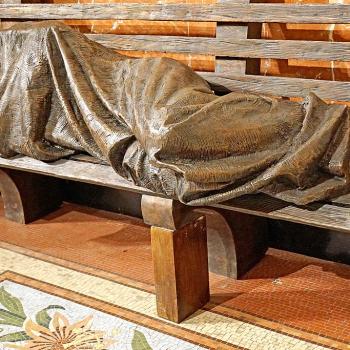 By Rev. James Dallen - May 12 2009
By Rev. James Dallen - May 12 2009
State by state, in courts and legislatures, gay marriage moves forward. Opponents charge that the "faith community" is being ignored or attacked. The Vatican and U.S. bishops have been especially vocal in their opposition, second only to evangelicals.
Rank-and-file Catholics have been more accepting. But some bishops condemn politicians and citizens who support gay marriage. They claim that legalizing gay marriage means approval of immoral activity and will eventually endanger religious freedom.
Can a faithful Catholic support legal gay marriage?
The answer, I think, is yes. Let's focus on a Catholic's role as a citizen, first clarifying the relationship of law and morality in a pluralistic society and then noting how Church and State have
very different understandings of marriage.
Medieval Christendom linked law and morality. To be just, a law had to be according to reason. To be according to reason, it had to be according to nature. Metaphysically "nature" is the intrinsic
structure of human being, what it means to be human. However, nature has usually been understood more physically and biologically than rationally when dealing with sexuality. A physical understanding prejudices the conclusion.
The Enlightenment perspective in our founding documents also focuses on reason and nature. It recognizes that groups will differ on how to understand them and come to different moral conclusions. As a consequence, the common good in American society is a social order that maximizes individuals' freedom and protects everyone's rights. Law's relationship to morality is incidental except as a reflection of public consensus. Law's purpose is to maintain social order when the views of different
groups conflict.
Pragmatic, yes, and it has generally worked. Of course, it takes time for citizens to recognize that people who are not part of the dominant race, gender, or sexual orientation ought to have equal
dignity and equal treatment under the law. Sometimes churches are even slower to reach that conclusion.
In a secular pluralistic society law does not enforce any group's moral views. Its goal is to protect the social order from being torn apart by competing groups. It protects the rights of all and particularly those of minorities who might otherwise be discriminated against. The responsibility of citizens is is to work for laws that do this. I think that includes laws that ensure equal rights and responsibilities for those in same-sex unions.
But should the word "marriage" be used for these unions? There I confess to ambivalence. This is a radical departure from how marriage has been understood. I'd rather that the State regulate
the legal effects of civil unions, heterosexual and homosexual, and leave marriage to the churches.
Catholicism regards marriage as a faith-commitment modeled on the relationship of Christ and Church. It is the unconditional, permanent, and exclusive commitment of a man and a woman to
each other. It is a community of love in the service of life, the life together of the spouses and the new life they together bring into the world.
Civil law, on the other hand, regards marriage as a contract between two individuals and concerns itself with the legal effects of the relationship. The relationship may be conditional (a prenuptial agreement); it is not necessarily permanent (divorce); it need not be exclusive (adultery is not illegal); the parties may choose not to have children.
The State is concerned to protect the rights of the contracting parties and their families and, ultimately, social order. As the Iowa Supreme Court said, the State otherwise has no compelling
interest in the gender of the contracting parties. It must therefore sanction same-sex marriage. On the basis of its premises and presuppositions the State cannot violate individuals' rights or deny equal treatment.
The State does not give moral approval. Neither does it prohibit moral judgment that respects human dignity and rights.
The religious understanding of marriage has evolved, of course. Despite the use now made of the Genesis creation stories, Israel accepted polygamy. Early Christians argued against remarriage
after a spouse's death (digamy). Medieval theologians debated whether marriage was a sacrament. Arranged marriages were accepted for centuries. The requirement of a church marriage dates only from the sixteenth century. Until very recently procreation was called the primary purpose of marriage and love was secondary.




